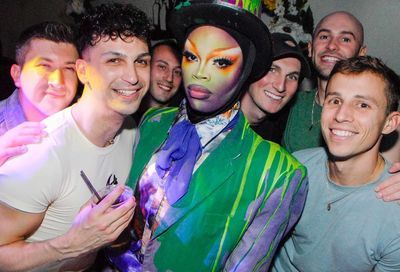LGBTQ candidates and allies fuel progressive reform movement in Rhode Island
With the backing of "The Co-op," LGBTQ political reformers and allies are challenging conservative Democrats in one of the nation’s bluest states

“Rhode Island has historically been known as a very blue state,” says Rhode Island State Rep. Moira Walsh (D-Providence). “But because of that, politicians have figured out that the only way to get elected is to call themselves Democrats in name — so you have [Democrats] who have an A+ rating from the NRA and are endorsed by anti-choice organizations like Right to Life.”
Walsh’s comments come just days after U.S. Sen. Jack Reed (D-R.I.), a mainstream liberal with a voting record well to the left of the nation’s upper chamber, endorsed several Rhode Island candidates with a slew of conservative stances, including opposition to abortion rights and same-sex marriage, as well as economic and environmental issues contained in the national party’s platform.
For Walsh, it’s nothing new. The two-term state representative is used to being ignored by her own party for advocating for things that would place her in the mainstream of the Democratic Party in any other state.
But in small, insular, go-along-to-get-along Rhode Island, it makes Walsh — an out bisexual single mother who worked as a waitress and a labor organizer when she was first elected to office — a marked woman.
In 2018, her race made national news after the Rhode Island Democratic Party endorsed her opponent, a former registered Republican who calls himself a “moderate” but had an Internet history of social media comments supporting President Trump or retweeting alt-right figures like Roseanne Barr, James Woods, and QAnon supporter Laura Loomer, who recently won a the Republican nomination for a seat in Congress in South Florida.
“In my first two cycles, I ran against the Democratic Party, because even though, last cycle, I was the Democratic Party, I received no support from my party, because they decided that my adherence to the national party platform was, in our state, somehow radical,” Walsh says, noting that she has particularly been targeted by House Speaker Nicholas Mattiello (D-Cranston) for her outspokenness. (In past cycles, some progressive legislators have found themselves on the receiving end of primary challenges for not voting in lock-step with Democratic leaders, regardless of whether the legislation would help their district.)
After the party endorsed her opponent last cycle, Walsh got some backup when she scored an endorsement from Congressman David Cicilline (D-R.I.), the former mayor of Providence and a former state representative. But she and a handful of other Democrats who occasionally buck the Speaker of the House or the Senate President have essentially had to fight their battles with very little support.
That is, until the emergence of the Rhode Island Political Cooperative, also known as the Co-op, a not-for-profit corporation that provides support to candidates running on a set of progressive issues.
Among the issues supported by politicians backed by the Co-op are: reforming the state’s tax system — which in its current form places a larger burden on lower-income earners — abortion rights, marriage equality, affordable housing government transparency and reform, an end to reliance on corporate money in politics, single-payer health care, and a Green New Deal. In total, the Co-op is backing 24 candidates for various offices around the state.
While some argue that 24 candidates running for various offices is not enough to effect change, members of the Co-op note that there are other candidates, including some reform-minded incumbent lawmakers not backed by the Co-op, with whom progressives could partner to push progressive legislation or block what they consider “bad” bills from passing.
“What I said when the Co-op first formed is that I imagine this it what it feels like with [a] real Democratic Party that cares about its members and wants to help women and people of color and queer people get elected and puts their money and resources into electing candidates with those values,” says Walsh.
“It used to be there would be an outlier of ‘This guy believes in almost all of the Democratic Party’s principles except for this or that issue.’ But now it feels like trying to find the way in which these Democrats are Democrats is harder than ever,” she adds. “The progressive wing of the party is constantly being scolded for being ‘purists’ and not being inclusive. But at the same time, you know, we can disagree on plenty of things, but we can’t disagree on my humanity. And it’s 2020 and there are still representatives, self-proclaimed Democratic representatives, in the House who would vote against same-sex marriage bills.”
See also: Pennsylvania Democrats endorse Trump-supporting homophobe, reject bisexual progressive
As an out bisexual, Walsh says that she receives little pushback because of her identity, although she notes that a number of out LGBTQ candidates are more likely to feel a sense of acceptance within the ranks of the Co-op than within the state Democratic Party.
“There is a large section of the population in general that doesn’t understand or appreciate identity politics,” Walsh notes. “And I will say that I definitely do not lean on my queerness in order to earn anything vote-wise. Because first of all, in this neighborhood, nobody would care. And second of all, I mean, that feels like a really weird way to live my life. I by no means hide it. [But] it’s a non-issue now.”
Jennifer Rourke, one of the co-founders of the RI Political Cooperative, who is currently seeking the 29th State Senate District Democratic nomination this cycle, says she was first motivated to run during the 2018 cycle after her son came out as LGBTQ.
“I have a 22-year-old that came up to myself and my husband right before the last cycle, and he said, ‘Hey mom, you know if I don’t have a family that happens naturally, certain states will block me. So what are you going to do to fix it?’ And that’s when I took a look at who was around us and who was representing us. And I said, ‘OK.’ And I put in my hat. I was two weeks postpartum from surrogacy and started knocking doors.”
Although she lost her bid for the seat last term, Rourke says she’s learned political lessons since then, including that she is effectively on her own when it comes to organizing her neighbors to vote for her. The Co-op, in a way, serves as a sounding board and support system for other progressive candidates who aren’t going to get backing from the state Democratic Party.

Like most of the Co-op-backed candidates, Rourke advocates for expanded health care coverage, decrying premium increases that were recently approved by the state’s insurance commissioner, advocating for the legalization of cannabis — which has been legalized in nearby Massachusetts — environmental justice issues, and government reform in how legislative grants are doled out to lawmakers.
“There’s legislative grants that are not used properly, or are not awarded to legislators the right way, unless, you know, you ‘kiss the ring,’” she says, referring to how legislative leaders often deny grants to punish independent-minded lawmakers. “But I would like to make it equal all the way around so that every legislator receives the same amount.”
Unfortunately, Rourke’s political involvement has placed a target on her back as well: in May, during a virtual Zoom “town hall” meeting with other candidates, Rourke, who is black, was attacked by online trolls who hurled racial epithets and racist comments at her and told her to “get lynched.”
“The chat was open and [we could see] the Q&A portion. And whoever it was, they were ready. And it was just paragraphs of the N-word. And then they told me to get lynched,” she says. “I’ve been called a lot of nasty names in my life. I have never been told to get lynched. The police got involved and took a report. They’re still investigating now.”
After news of the troll attack went viral, Rourke says Missouri congressional candidate Cori Bush, a progressive who’s all but certain to be elected to the U.S. House of Representatives in November after defeating an incumbent in the Democratic primary, called her to offer support.
“We spoke that night and she told me, ‘You can’t give up. You just have to keep pushing for it,’” says Rourke.
See also: Congressman slams progressive challenger for calling the gay rights movement “the devil”
Other Co-op-backed candidates say the uphill battle that any insurgent faces when challenging an incumbent is exacerbated by local media outlets, which often have a right-wing slant that creeps from their editorial arm into their coverage.
Lenny Cioe, a Co-op-member and nurse who is challenging Senate President Dominick Ruggerio (D-North Providence), says he’s tried to reach out to local talk radio hosts to talk about his candidacy, but has never heard back. As an openly gay man, Cioe says even less partisan media outlets have erased or refused to report on his LGBTQ identity.
“I was interviewed for an article in the paper about campaigning during coronavirus, and I kept talking about my husband, and how he’s helping me through this,” Cioe notes. “Not once was that mentioned in the article.”
Cioe, 61, says that as one of the older candidates who are part of the Co-op, he finds that getting a progressive message to resonate in a state with an aging population and a large number of traditionally Catholic, white working-class voters often requires reframing the issue in simpler, more tangible terms, rather than using the “buzzwords” and consultant-speak that get retweets and likes among left-leaning users on social media.
“When we talk about raising the income limit of the top one percent, I say, ‘You work hard for your money, don’t you?’ And they tell me, ‘Yes.’ And I say, ‘You like keeping money in your pocket, don’t you?’ And they say, ‘Yes.’ And I say, ‘So why should the top one percent be allowed to keep more money in their pockets than you are? What is the difference between their day of work and your day of work?’” Cioe says. “I say, ‘And don’t you want your property taxes to come down so you can have more money in your pocket?’ And I relate it directly to them. I don’t talk about how the state can use it.”

Cioe also says adopting a less militant tone when engaging with voters is much more successful than sloganeering.
“Take the time and teach. It’s about teaching them what power they have,” he says. “That’s why I always say health care is an investment [in] every Rhode Islander. So they realize that they need to invest in themselves and take pride, and not be held hostage by insurance companies. That’s how I word it so they understand. Everybody bitches about paying money for education, but education is a down payment on the future. I say, ‘Don’t you want well-trained people to be able to take care of you once you’re older and you need help?’”
Cioe says that unlike the gatekeepers of local media outlets, most voters don’t seem to take issue with his sexual orientation, and many of his would-be constituents are already familiar with him because of his involvement in the local community. Sometimes, he says, his orientation even plays out as an asset with some voters.
“There was this guy, Augustino, you’ve got to picture this, typical Italian, he had the stogie in his mouth, shirt off, shorts on, black socks and dress shoes watering the lawn. And it was really hot. So I walk up and say, ‘Augustino, I haven’t heard that name in so long. I had an uncle with that name.’ We were talking back and forth, and he says to me, ‘So what are you here for?’ And I say, ‘I’m Lenny Cioe and I’m running against Dominick Ruggerio.’
“And he says to me, ‘You’re the cocksucker that’s running against him. I like you. You got balls. You’re not afraid of anything. Let me introduce you to my wife!’ So I talk to his wife, they’re both going to vote for me, and as I’m leaving, I go up to to Augustino — he’s like ‘Call me Gus” — and I say, ‘Gus, let me tell you something, My name’s Lenny. You call me a cock sucker again and you’re going to be spitting teeth.’ And he says, ‘That’s why I like you! You’re not afraid!’
“I think because I’m not afraid, it overpowers the gay part, if that makes sense,” Cioe says. “I hear that over and over again: ‘Aren’t you afraid of running against [Ruggerio]?’ And I tell them, ‘Look, I’m gay. You know how much shit has been thrown at me over the years. What’s he gonna do?”
Tiara Mack, who moved to Rhode Island to attend Brown University and has since gotten involved in various political campaigns, including advocating for reproductive justice and LGBTQ rights, is running for Rhode Island’s 6th Senate District against a similarly-entrenched incumbent who has served in public office for 29 of the past 35 years.
“I started working on local campaigns for the first time in 2014, and that’s when I got the hint that Rhode Island politics wasn’t what I thought it was, coming from the South to the ‘liberal blue North,’” she says.
Mack hits her opponent, Sen. Harold Metts (D-Providence), over his work on a commission tasked with reforming the Law Enforcement Officers’ Bill of Rights — a 1976 law that critics say protects officers accused of misconduct from facing disciplinary measures — arguing that the reforms being suggested don’t go far enough.
She also criticizes him for failing to work on affordable housing in a district where many longtime black and brown residents are being displaced by gentrification, and on environmental issues, noting that some of the district’s neighborhoods have some of the highest childhood asthma rates in the country, and warning of the detrimental health effects that could result from the the construction of a proposed waste transfer site along the Port of Providence, located within the district’s boundaries.
Mack also notes that Metts has amassed a record of opposing most pro-LGBTQ pieces of legislation throughout his years in office, something that also motivates her in this campaign.
“I connect my blackness to political identity and my queerness to political identity. Both of those identities are inherently political,” she says.
Mack has also received some pushback for challenging Metts, who is currently the only sitting black senator in Rhode Island. But she argues that he has failed to keep pace with the demographic and ideological shifts in the district.

“This district has changed so much over the last few years. And to have someone who is just not ready to have those conversations about what it means to represent the Afro-Latino community, the Latino community is not black, the immigrant community, the queer community, in a lot of issues that we are facing, especially during COVID-19 — homelessness, job loss, health care — that is an issue,” she says. “We cannot omit those identities and we also, quite frankly, in 2020, can’t have someone that is not willing to remove your personal ideologies from a conversation and narrative about what is best for people.”
Mack says she has been warned by some residents to downplay her LGBTQ identity, on the assumption that older black voters in the district would sour on her candidacy.
“A lot of people have said, ‘Well, you know, the queer queer stuff doesn’t really resonate with the older black community,’” she says. “But I’m not here to resonate with anyone. I’m here to be my true, authentic self.”
She hopes that on Election Day, she will prove all her naysayers wrong.
“I’ve been told everything from ‘you’re too young’ to ‘you don’t have what it takes here.’ I’ve had my integrity questioned, my intelligence questioned. But I know that people, when I’m at their doors, have said we need change,” Mack says. “Yes, we can have hope and we can be audacious in the things that we want to put out into the world. But we also have to put that in action. We have to put it into policy.
“We have to have those difficult conversations. We have to push back against the system,” she continues. “Because if we are unwilling to push back against the system that is literally killing our community through policies, then we’re not doing the work that we are tasked with doing for our community as elected officials.”
For more information on the Rhode Island Political Cooperative, visit www.ripoliticalcoop.com.
Read more:
Texas assistant attorney general fired after calling LGBTQ people an ‘abomination’
Court orders release of U.S. Marine jailed for killing transgender woman in the Philippines
Christian principal expels gay student, says ‘Jesus would want me to’
Support Metro Weekly’s Journalism
These are challenging times for news organizations. And yet it’s crucial we stay active and provide vital resources and information to both our local readers and the world. So won’t you please take a moment and consider supporting Metro Weekly with a membership? For as little as $5 a month, you can help ensure Metro Weekly magazine and MetroWeekly.com remain free, viable resources as we provide the best, most diverse, culturally-resonant LGBTQ coverage in both the D.C. region and around the world. Memberships come with exclusive perks and discounts, your own personal digital delivery of each week’s magazine (and an archive), access to our Member's Lounge when it launches this fall, and exclusive members-only items like Metro Weekly Membership Mugs and Tote Bags! Check out all our membership levels here and please join us today!























